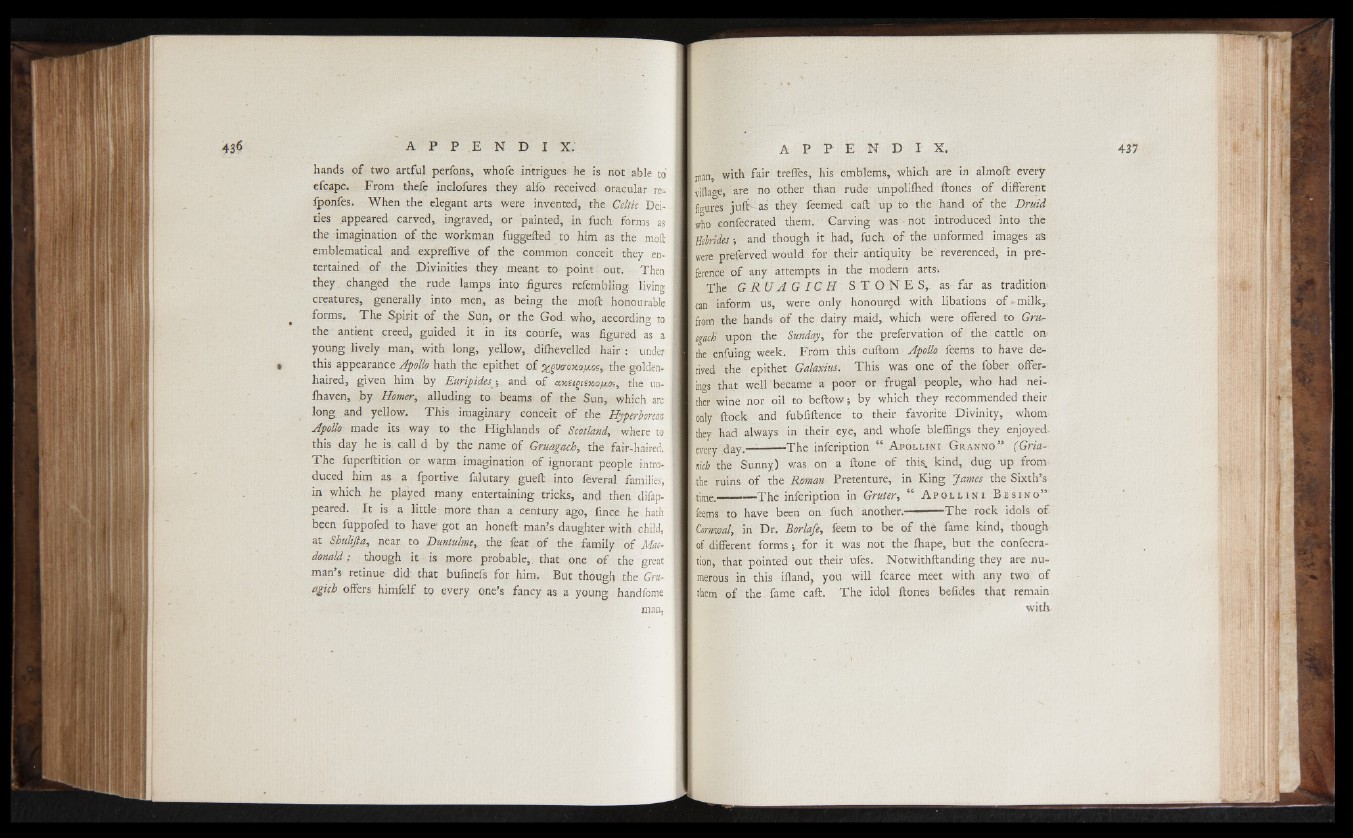
hands of two artful perfons, whofe intrigues he is not able to
efcape. From thefe inclofures they alfo received, oracular re-
lponfes. When the elegant arts were invented, the Celtic Deities
appeared carved, ingraved, or painted, in fuch forms as
the imagination of the workman fuggeited to him as the moft
emblematical and expreffive of the common conceit they entertained
of the Divinities they meant to point out. Then
they changed the rude lamps into figures refembling living
creatures, generally into men, as being the moil honourable
forms. The Spirit of the Sun, or the God. who, according to
the antient creed, guided it in its courfe, was figured as a
young lively man, with long, yellow, diihevelled hair : under
t this appearance Apollo hath the epithet of %puo-oxoy.os, the goldenhaired,
given him by Euripides^-,, and of ci/tiipimcyc-, the unihaven,
by Homer, alluding to beams of the Sun, which are
long and yellow. This imaginary conceit of the Hyperborean
Apollo made its way to the Highlands of Scotland, where to
this day he is call d by the name of Gruagach, the fair-haired.
The fuperflition. or warm, imagination of ignorant people intro*
duced him as a fportive falutary gueft into feveral families,
in which he played many entertaining tricks, and then difap-
peared. It is a little more than a century ago, fince he hath
been fuppofed to have got an honeft man’s daughter with, child,
at Shulijla, near, to Duntulme,. the feat of the family of Macdonald
: though it is more probable,, that one of the great
man’s retinue- did: that bufinefs for him, But though the Gru-
agich offers himfelf to every one’s fancy as a young handfeme
man,
man, with fair treffes, his emblems, which are in almoft every
village, are no other than rude unpoliihed flones of different
figures juit as they feemed call up to the'hand of the Druid
who confecrated them. Carving was not introduced into the
Hebrides -, and though it had, fuch of the unformed images as
were preferved would for their antiquity be reverenced, in preference
of any attempts in the modern arts.
The G R U A G I C H S T O N E S , , as far as tradition-
I I can inform us, were only honoured with libations of * milk,,
from the hands of the dairy maid,, which were offered to Gru-
egach upon the Sunday, for the prefervation of the cattle on
the enfuing week. From this cuftom Apollo feems to have derived
the epithet Galaxius, This was one of the fober offerings
that well became a poor or frugal people, who had neither
wine nor oil to beftow -, by which they recommended their
only flock and fubfiitence to, their favorite Divinity, whom
they had always in their eye, and whofe bleffings they enjoyed.
every day.— The infcription “ A p o l l i -n i G r a n n o ” (Grianich
the Sunny) was on a ftone of this, kind, dug up from
the ruins of the Roman Pretenture, in King James the Sixth’s
I I time.---------The infcription in Gruter, 11 A p o l l i n i B e s i n o ”
I feems to have been on fuch another. ■■"•-The rock idols of
I Gornwal, in Dr. Borlafe, feem to be of thè fame kind, though
[of different forms ; for it was not the fhape, but the confecra-
I tion, that pointed out their ufes. Notwithflanding they are nu-
I merous in this ifland, you will fcarce meet with any two of
I them of the fame call. The idol Hones befides that remain
with